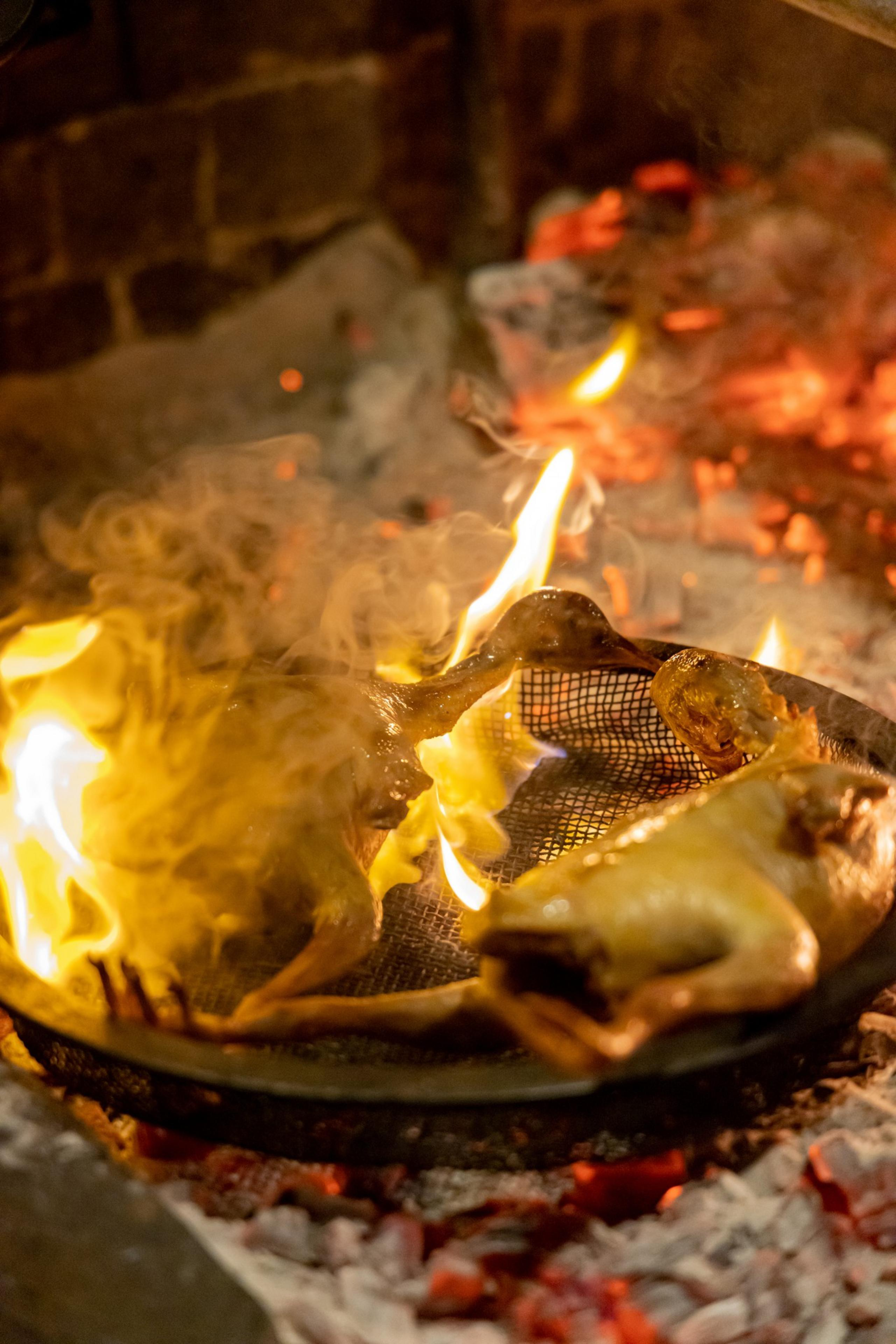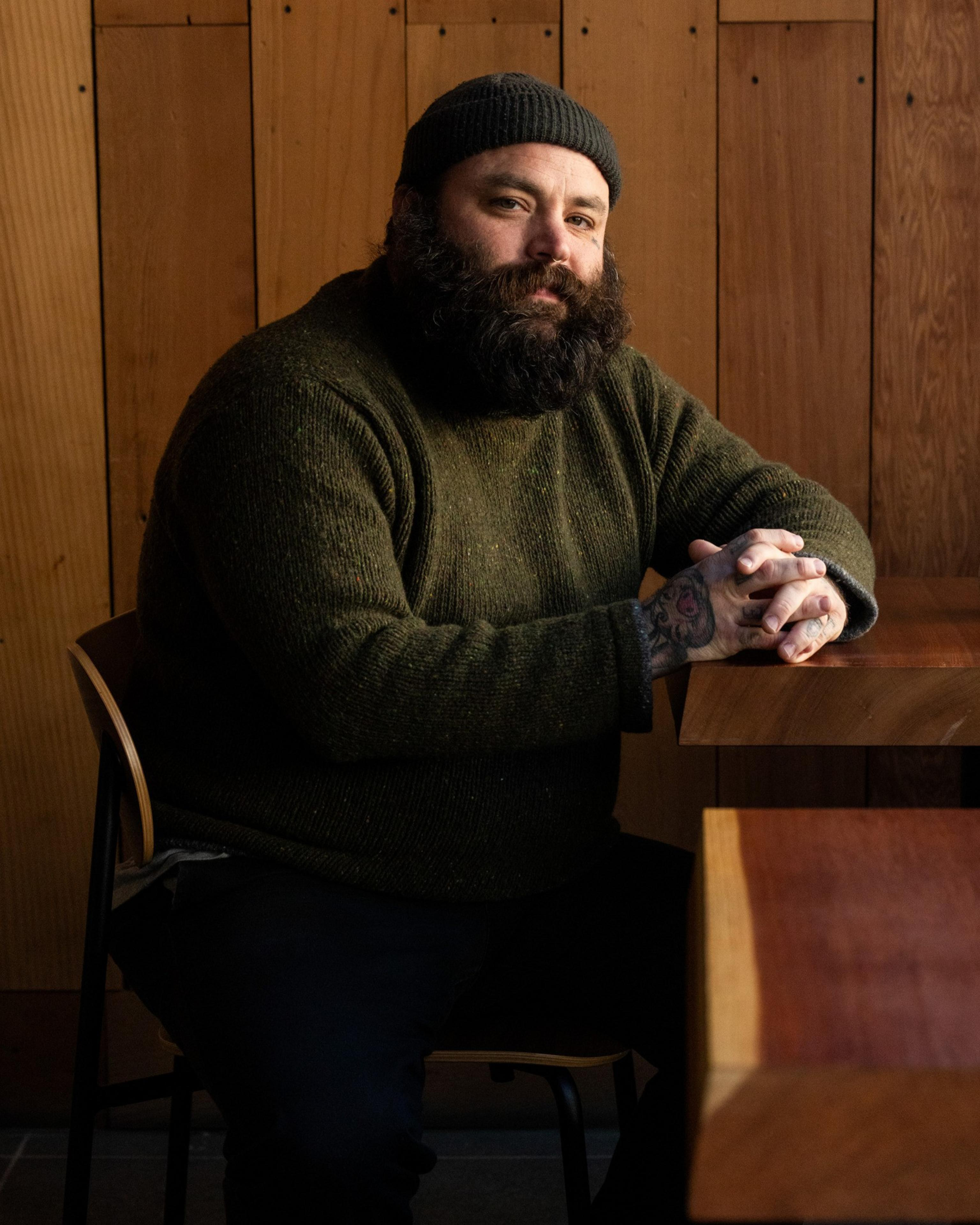The tattoo on chef Seth Stowaway’s knuckles says “seeklife,” but he will be the first to tell you that he has not always done this. Since his days addicted to drugs — a “crackhead,” as he puts it, “like, smoking rocks and robbing people in the Tenderloin” — he has clearly had a love-hate relationship with his existence. Today, he’s proud of it: He’s 14 years sober, a husband, a father, and a San Francisco restaurateur with a Michelin star.
Of all the things Stowaway has accomplished during his sobriety, the restaurant, Osito, opened in the thick of the pandemic, has arguably been the most hard-won. After two decades in the industry, working as executive chef of the Bar Agricole group and sous chef at Mister Jiu’s, Stowaway struck out on his own and, in 2020, opened his cozy, wood-clad, live-fire restaurant in the Mission. After a couple of years of serving up the likes of delicate egg custard baked in ashes, Dungeness crab risotto with chile crisp, studded with teensy pine cones, and asparagus jerky, he garnered his star.
Regardless of his experience, he was not prepared for the trials and tribulations of restaurant ownership, from fundraising (“turns out you need a real chunk of change to start”) to public relations (at a cost of $6,000 per month).
So, in an attempt to seek out the secret to restaurant sustainability, Stowaway went to his unofficial support group — the Bay Area Restaurant Coalition, made up of owners of restaurants that he considers “some of the best in the world,” including State Bird Provisions, Flour + Water, Liholiho Yacht Club, and Che Fico — who meet quarterly to share war stories. Listening to fellow restaurateurs’ failures and successes, he had an aha moment: The ones who seemed to be doing the best owned more than one restaurant, which allowed them to combine overhead costs and allocate resources to each location. But what if there were a way for a single-restaurant operator to do this? What if, in the spirit of “stronger together,” a group of independent restaurants could, well, share?
This was the start of The Same Sun (opens in new tab), a hospitality collective that’s part Y Combinator, part kumbaya food cooperative, which Stowaway launched in January. “What started out hippie became a real thing,” he says.

Once a restaurant joins The Same Sun, it pays 6% of revenue into a general pool, with a cap of $15,000 a month. In return, each restaurant gets full access to a host of services: financial management, legal compliance, human resources, project management, and public relations (including a photographer). The PR is handled by an independent contractor, Kaity Cash; the photographer is San Francisco-based Molly DeCoudreaux; HR is by Next Level Strategies; and Inventus Law is the go-to for legal advice. There’s even marketing for collaborations between the restaurants.
The current membership is small — basically, Stowaway’s closest friends in the business, including Thad Vogler of spirits company Bar Agricole, Kelly Kozak and Josh Donald of Bernal Cutlery, Maz Naba of Lebanese pop-up Ilna, and a forthcoming restaurant in Berkeley. Stowaway says there’s “lots of interest” from other restaurants, but clearly, he’s hoping that this story, pitched by publicist Cash to this writer, will help spread the gospel.
Vogler, a self-proclaimed cynic who’s had successes and failures in San Francisco’s restaurant world, calls the industry “death by a thousand cuts — all these kinds of infrastructure services add up. Seth’s attempt to consolidate them means that they’re costing me essentially half as much.”
And while the savings are nice, he’s taken too by the ability to commiserate with like-minded people, especially in a restaurant town that’s dog-eat-dog. Kozak agrees. “I’m all about community building,” she says. “Not in the corny way, but I think it’s really important to do things together.”

Sitting in a dark corner of Osito one Tuesday afternoon, in the quiet hours before dinner service, Stowaway strokes his bushy beard. In a stream of consciousness, he rattles off a long list of lessons learned. “I have all these ways where I’ve blown it,” he says. “When your skin is in the game, it’s a whole other thing.”
When he started Osito, Stowaway handled back-office functions like HR, public relations, and accounting in house. “That’s what almost took us down,” he says, noting that those operations cost him up to 12% of his revenue. “And then I was like, OK, well, we’ll outsource it all. But that almost took us down, too. And then I found out that people don’t really outsource it. They just don’t have these services.”
So he tried letting go of it all. But not having a publicist meant the restaurant didn’t get press. And eliminating accounting meant there were no financial projections. “I stayed up endless nights, you know, building financial models, and that wasn’t what I should have been doing,” he admits.
His greatest hope is that The Same Sun will do all this and more for its members. Chef Brandon Jew of Mr. Jiu’s is not a member of the collective but sees the value it could have, “especially for those new restaurant owners who need some extra support, who might need connections,” he said.
Stowaway also wants The Same Sun to operate in the vein of a tech incubator, helping restaurants go from conception to fundraising to opening. “We also have a team of chefs who can help create a menu and have the kitchen organized,” he said.
Stowaway, who is very spiritual — “God-led,” as he puts it — has noted that perhaps his struggles at Osito haven’t been for naught. “I’ve just been feeling like someone has been trying to tell me, ‘This job has not been what I’m preparing you for.’ I think being in a relationship with humans might be the most important thing. But don’t get me wrong — I still love being a chef.”
